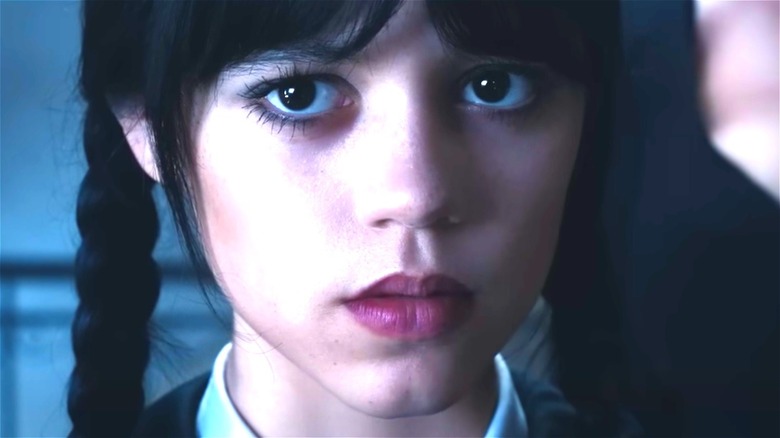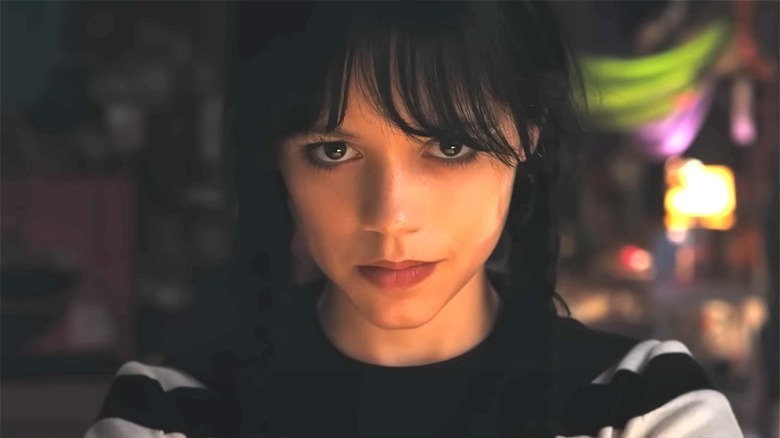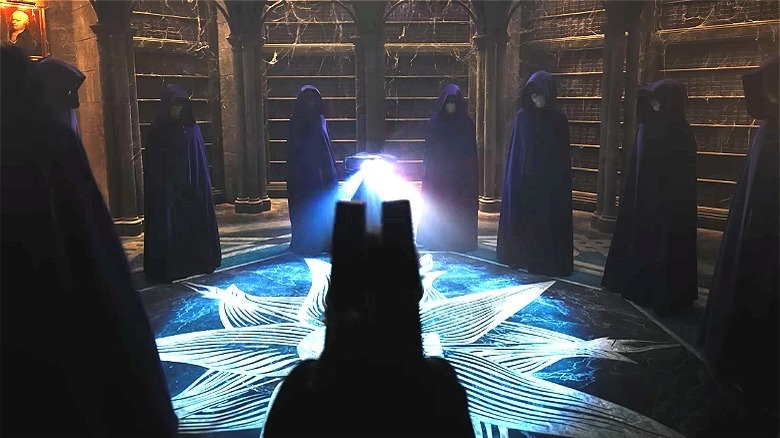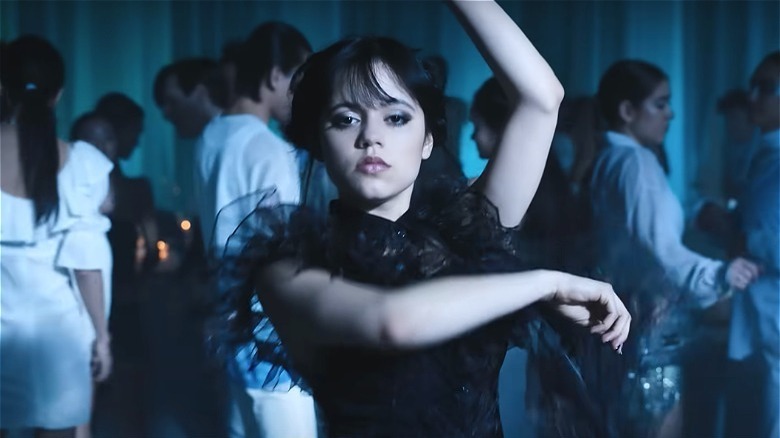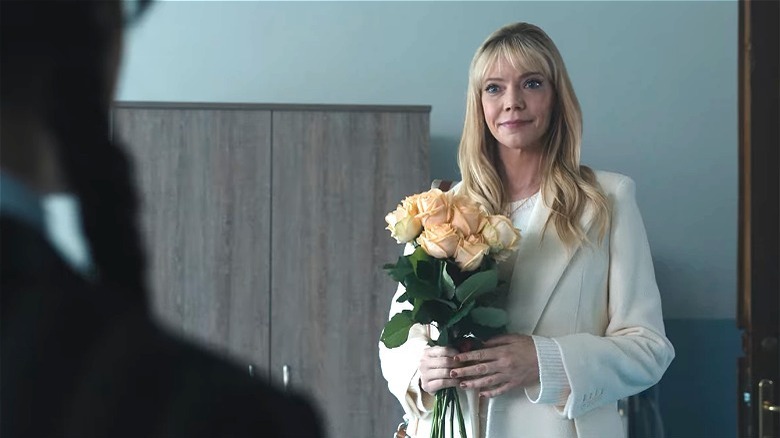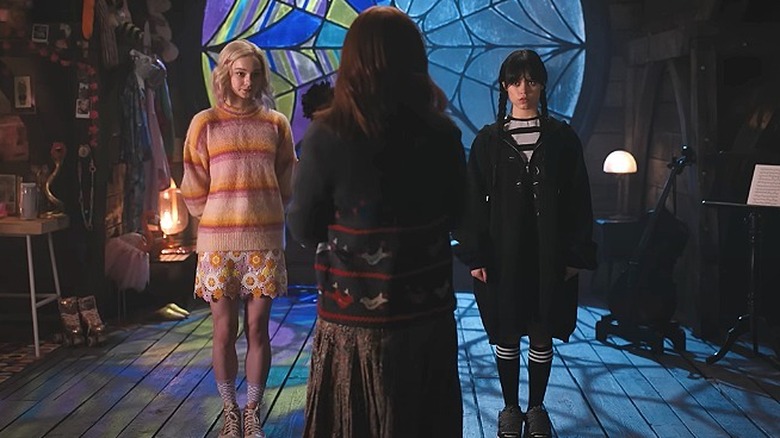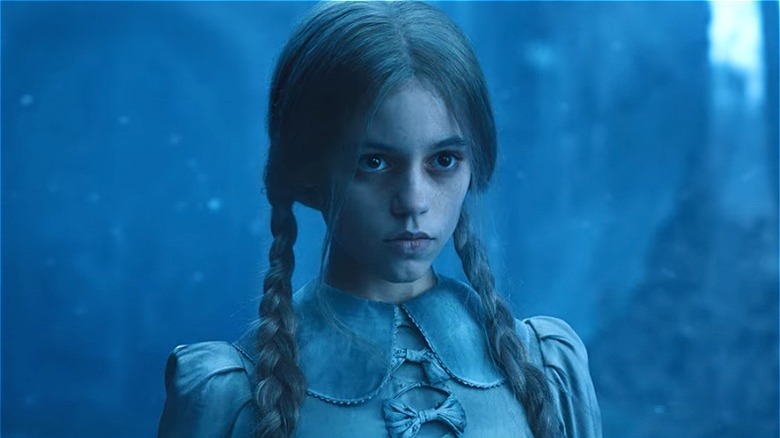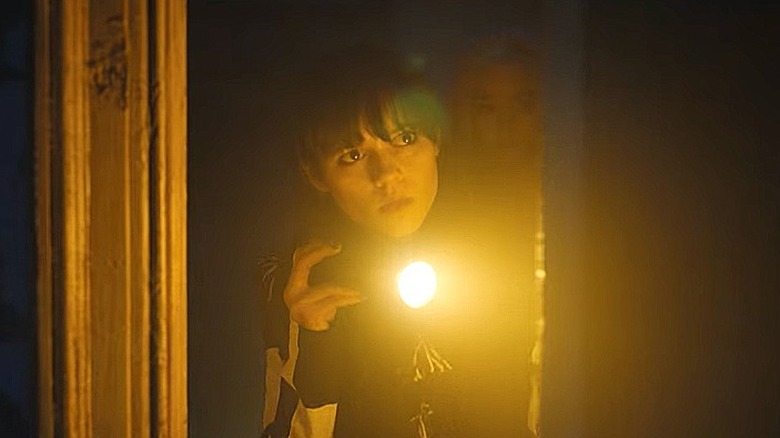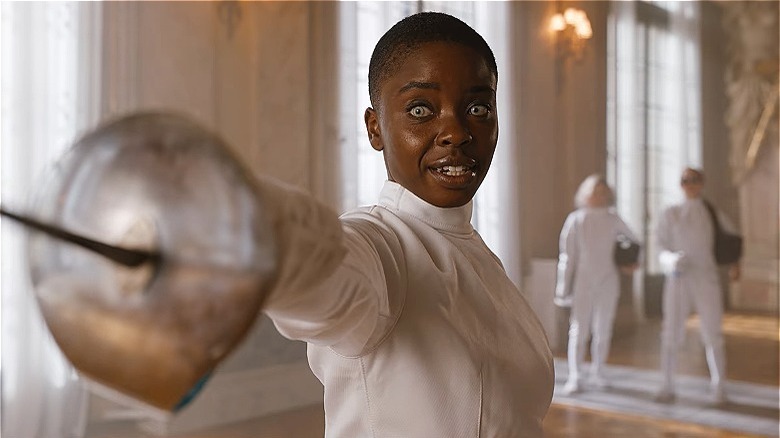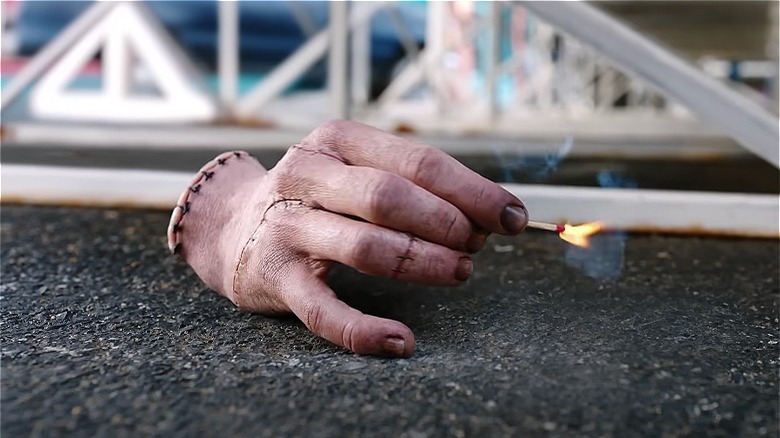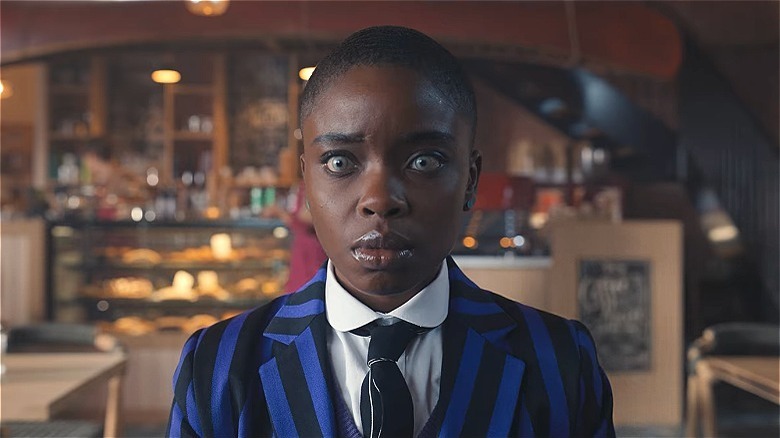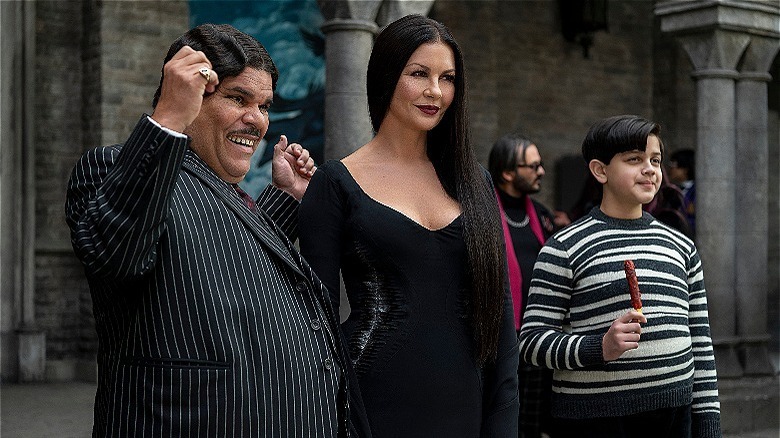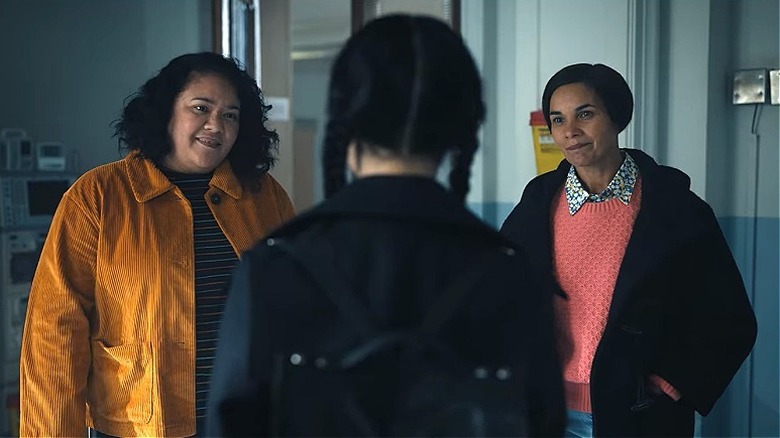Netflix's Wednesday: The 6 Best And 6 Worst Things Ranked
Get your snapping fingers ready and your favorite black eyeliner on, because the "Wednesday" series has finally made its way to Netflix. Starring Jenna Ortega as the titular harbinger of woe, the show covers all the teenage angst and spooky trappings that fans of "The Addams Family" — from the 1930s cartoon by Charles Addams to the 1960s TV series to the '90s movies and beyond — know and love.
After being expelled from public school, Wednesday Addams has been enrolled into Nevermore Academy, the alma mater of her parents, Gomez (Luis Guzmán) and Morticia (Catherine Zeta-Jones). Nevermore is made up almost exclusively of students with supernatural dispositions, and the hope is that Wednesday will fit right in. However, as die-hard fans already know, Wednesday has never been one to conform to any sort of societal norm.
So far, the show has received fairly mixed reviews from critics, but general audiences seem impressed (via Rotten Tomatoes). So what is it that makes "Wednesday" so enjoyable, and what about it gives us the heebie-jeebies? Here's our go-to list of the best and worst things about "Wednesday."
Spoilers ahead for "Wednesday" Season 1.
Best: Jenna Ortega as Wednesday Addams
Wednesday Addams is undoubtedly one of the most beloved characters of the "Addams Family" franchise. Her deadpan expression and love of all things macabre are somehow endearing traits that have made her an American icon. Portrayed by 10-year-old Christina Ricci in the 1991 and 1993 Barry Sonnenfeld movies, whoever would take on the mantle of the woeful Wednesday would have some massive shoes to fill. Thankfully, Jenna Ortega is the perfect gothic Cinderella in this scenario.
Ortega captures the spirit and appearance of Wednesday Addams perfectly, from her black-and-white accouterments to her grim expression and spot-on sardonic delivery. Somewhat predictably, she's also at the center of some of the most memorable moments in "Wednesday," including taking revenge on the swim team for bullying her brother Pugsley (Isaac Ordonez) by dropping a school of blood-thirsty piranhas into the swimming pool.
In another hilarious scene, Wednesday is forced to volunteer at the local pilgrim theme park for the school's outreach program. Dressed in colonial garb, she informs a group of tourists that the fudge they are sampling is made from cacao beans "procured by the oppressed indigenous people of the Amazon," and that the "proceeds go to uphold this pathetic whitewashing of American history."
While we'll always have a place in our hearts for Ricci's Wednesday, but Ortega's portrayal lives up to the legend.
Worst: The Nightshades secret society has no point
There's nothing like a good old-fashioned secret society to up the ante of a compelling mystery. "The Da Vinci Code" has the Illuminati, "Eyes Wide Shut" has a freaky sex cult, and "Rosemary's Baby" has a group of fanatical Satanists. In "Wednesday," there's the Nightshades — an exclusive club at Nevermore Academy that was founded by Wednesday's ancestor, Goody Addams. Both her mother and father were members of the Nightshades, and it appears that the school has kept with the tradition over the years. However, the Nightshades during Wednesday's time at Nevermore are not what they once were.
During Wednesday's investigation of the school, she discovers a secret entrance via a statue of Nevermore's namesake, Edgar Allan Poe. After solving the riddle to get inside, Wednesday goes into the dark sanctum hoping to find answers. Instead, she is grabbed by unseen assailants, who put a bag over her head and tie her to a chair. It turns out that she has stumbled upon the secret headquarters of the Nightshades, which is made up of the school's most prominent students. What first appears to be a dangerous violation of forbidden territory turns out to be a harmless prank performed by privileged elitists. After freeing herself from her bonds, Wednesday turns her nose up at the group and rejects their invitation to join.
Despite the shadowy aura that first seems to surround the Nightshades, it's a disappointment to discover that the so-called "secret society" is a flop. Even the trailer for "Wednesday," which includes dark figures in hooded cloaks and masks, seems to imply that they would play a big part in the story. It turns out that the whole thing was an elaborate fake-out, and we are as disappointed as Wednesday that the Nightshades are an overrated frat house that had little to do with the overall plot.
Best: The music in Wednesday
The music in "Wednesday" plays an important role in the series — almost as much as the characters themselves. A longtime collaborator with Tim Burton, composer and recording artist Danny Elfman teamed up with fellow composer Chris Bacon to provide the show's soundtrack. They also composed the main theme for "Wednesday," which uses a Baroque-style harpsichord and a mournful cello that blend perfectly to fit the show's dark and mysterious motif.
The background music isn't the only part of the "Wednesday" soundtrack that stands out. There are also some popular tunes that are certain to catch your ear, though they are presented in new and unique ways. The first is classic rock hit "Paint It Black" by The Rolling Stones, which Wednesday performs on the balcony outside of her dorm room on her cello. In Episode 3, "Friend or Woe," we hear a haunting rendition of metal band Metallica's mournful ballad "Nothing Else Matters." This instrumental cover is performed by Slovenian-Croatian cellist Luka Šulić. This version of the heavy rock classic perfectly fits the dark tone of the series.
In Episode 4, "Woe What a Night," Wednesday shows off her unique moves on the dance floor to The Cramps' "Goo Goo Muck." The song punches with a rockabilly beat and goth-punk lyrics like "When the sun goes down and the moon comes up, I turn into a teenage goo goo muck." We're not sure what a goo goo muck is, but it sounds pretty cool.
Worst: An obvious red herring
The biggest mystery in "Wednesday" surrounds a creature called a hyde, which terrorizes the small town of Jericho and the Nevermore school. Wednesday discovers that the hyde is actually a human who transforms into a ferocious beast, and that their abilities were unlocked by someone who is now using them for their own means. Wednesday is determined to find out the monster's true identity, as well as the identity of the person pulling the strings.
Following the various clues, Wednesday deduces that the person helping the hyde is Laurel Gates, the younger sister of Garett Gates (Lewis Hayes), who suffered a fatal accident when her parents attended Nevermore. Laurel is hiding her true identity, however, and most believe that she died long ago. In "Wednesday" Episode 6, "Quid Pro Woe," Wednesday is visiting her friend Eugene (Moosa Mostafa) in the hospital when her court-ordered therapist, Dr. Valerie Kinbott (Riki Lindhome) arrives with a vase of flowers. After Wednesday leaves, Kinbott neatly arranges the vase filled with pale pink roses on a table. The camera focuses for a long moment on the flowers, so we know that they will come into play in a later scene.
Sure enough, when Wednesday, Enid (Emma Myers), and Tyler (Hunter Doohan) stake out the old Gates house, they find Laurel's old room recently lived in and decorated with the same pink roses from the hospital. Connecting the threads, Wednesday is led to believe that Kinbott is actually the missing Laurel Gates. But it all fits a little too neatly, and the fact that the hospital scene seems to linger a little too long on the roses makes it all too obvious that this is a classic misdirection — also known as a red herring.
Best: Tim Burton's style is perfect for Wednesday
Director Tim Burton has always had a unique view of the world. Throughout his most notable features such as "Edward Scissorhands," "Mars Attacks!" "Frankenweenie," and 1989's "Batman," Burton's art reflects his penchant to see the world from a fantastic, gleefully morbid perspective. It's a wonder that it took so long for him to deliver his own take on "The Addams Family" franchise, because it seems to fit him like a pair of fingerless, lacy Victorian gloves.
Burton directs four of the eight episodes of "Wednesday," and his trademark gothic aesthetic is present throughout. Wednesday's monochromatic attire is highlighted by various hints of color, such as the stained glass window in her dorm room that she shares with her werewolf roommate, Enid. Enid's bright personality is reflected by her fashion style, and the window on her side of the room is painted in bright colors. Wednesday's side, on the other hand, is colorless and bleak, as is her half of the large window. Wednesday is even fitted with her own custom black Nevermore Academy uniform, as she is apparently allergic to color.
It isn't just Wednesday Addams' look that gets the Tim Burton treatment. The setting of Nevermore Academy, with its stone walls, gothic architecture, and shadowy recesses are also reminiscent of Burton's previous work. The concept design for the hyde monster is also distinctly Burtonesque, with its wide, bulging eyes and rows of razor-sharp teeth.
Worst: Goody isn't a real name
Through her psychic visions, Wednesday is able to communicate with the spirit of her ancestor Goody Addams. Wednesday and Goody look almost identical, and Goody is also played by Ortega. We learn that Goody was a powerful witch who, like Wednesday, had visions. She was a sworn enemy of Jericho's oppressive founder Joseph Crackstone (William Houston), whose hatred of outcasts was all-consuming. In a truly despicable act, Crackstone gathers all the outcasts in Jericho and locks them in a building which is then set on fire, leaving everyone inside to burn alive. Goody would later curse Crackstone's remains so that he could never rise again.
The name "Goody" is certainly unusual, but most viewers might just dismiss it as an old-fashioned sign of the times. However, anyone who is knowledgeable in early American history (or of Arthur Miller's "The Crucible") might raise their eyebrows on this one. In the 17th century, Goody was actually used as a title for a married woman (via Thought Co.). It was short for "goodwife," and would be equivalent to today's use of "Mrs." In fact, this is where the phrase "goody two-shoes" comes from. So really, "Goody" isn't actually a name at all.
There is no mention of Goody Addams being married, and though it is possible that this was the case, the show's writers don't clarify either way. So we're left to assume that Goody is actually intended to be her first name, which may be irksome for any history buffs watching.
Best: A compelling mystery that keeps us guessing
At the heart of Season 1 of Netflix's "Wednesday" is a supernatural murder mystery that would give even Harry Potter a run for his money. A bloodthirsty monster, a dark prophecy, and a classic cover-up scheme all make Wednesday's time at Nevermore one to remember.
It all begins when a gargoyle statue nearly crushes Wednesday, and it's clearly no accident. The murder attempt is thwarted when a Nevermore student, Xavier Thorpe (Percy Hynes White) pushes Wednesday out of the way of the plummeting statue just in time. It turns out that a fellow student with telekinetic abilities named Rowan (Calum Ross) believes that Wednesday is the source of a prophecy that foretells Nevermore's doom. When Rowan attempts to attack Wednesday directly, he is killed by a terrifying monster who immediately disappears into the shadows.
Like the teen detective hero of the novel she is writing, Wednesday takes it upon herself to uncover the seedy machinations happening at Nevermore Academy. During her investigation, she discovers not only the dark history of the town of Jericho, but the secret that her parents, Gomez and Morticia, have been hiding for years. Of course, at the heart of the mystery is the terrifying hyde — the monster that is killing both outcasts and normies alike without any seeming discrimination. "Wednesday" throws us for a loop as each episode reveals more of the bigger picture and ends with a surprising twist that very few could have seen coming.
Worst: The mean girl trope is played out
We've seen it a million times before — a competitive popular girl is somehow threatened by the weird new girl and makes it her personal mission to take her down. Because all girls hate other girls, right? Put two of them in the same room and the claws come right out. Rawr.
It's sad to say that the "Wednesday" series also uses this hackneyed trope. Bianca Barclay (Joy Sunday) is the most popular girl at Nevermore Academy — a siren with the power to use her voice to exert her influence over others. Bianca is arrogant and overly competitive, and Wednesday takes issue with Bianca's bullying and is determined to put her in her place.
The moment Bianca and Wednesday meet, there is an immediate animosity between them. When Wednesday volunteers to spar with Bianca in fencing class, Bianca greets her with, "You must be the psychopath they let in." To which Wednesday responds, "And you must be the self-appointed queen bee. Interesting thing about bees — pull out their stingers and they drop dead."
The rivalry between Wednesday and Bianca covers all of the overused cliches. Every box is checked, down to the two girls eventually learning to sympathize with one another and become allies. It feels a bit cringey that movies and TV shows still use the "mean girl" trope, rather than creating conflict between characters in more imaginative ways.
Best: Thing steals the spotlight
He's the most mysterious member of the Addams family clan, and yet he's so very handy. Thing plays a big role in Netflix's "Wednesday" as Wednesday's sidekick and confidante. Although he's sent by her parents to snoop on her, Wednesday recruits Thing for her own personal services. Thanks to his quick fingers and small stature, Thing can get in and out of most places unseen, making him the perfect little spy.
Thing absolutely steals the scene whenever he appears on the screen. Performed by Victor Dorobantu, Thing is able to convey the most complex of emotions despite his lack of form. We can feel his grudging anger at Wednesday as he indifferently flips through the pages of a magazine. We can also discern his casual smugness as he sits on the railing of Wednesday's bed, swinging his fingers back and forth like legs as he presents the dress he stole for her to attend the Raven dance. He may be just a hand, but his physical mannerisms make him feel like a whole person.
It isn't just Thing's physical performance that blows us away. He also has an emotional presence that is undeniable. He clearly cares about Wednesday, and his loyalty is unshakable, even when he doesn't agree with her actions. In the episode where Wednesday finds Thing impaled by a knife and bleeding to death, we couldn't help but feel a sense of panic at his possible impending doom. Thankfully Uncle Fester (Fred Armisen) is able to save Thing by using his electromagnetic powers, but it's a close call. Thing is not only Wednesday's partner in crime, he's also the voice of reason — except only in a metaphorical sense, because he doesn't have a mouth or a neck or any of the other stuff you need to produce a literal voice.
Worst: Bianca's story goes nowhere
Once Wednesday and Bianca set aside their differences at the dance in "Wednesday" Episode 4, the series begins to show Bianca Barclay in a new light. It's Parents Weekend at Nevermore Academy in the following episode "You Reap What You Woe," and the Addamses aren't the only ones in attendance. Enid also gets a visit from her werewolf family, including her overbearing mother who puts pressure on her daughter for not having "wolfed out" yet.
And then there's Bianca's mother — a siren named Gabrielle (Gracy Goldman) who shows up unexpectedly to Parents Weekend to visit her daughter. We learn from a conversation between them that Gabrielle is a member of a cult called Morning Star, which Bianca has recently escaped from. They argue over Bianca's return to the fold, with Gabrielle threatening to reveal a secret about how Bianca made it into Nevermore. Bianca later promises her mother to return to Morning Star at the end of the semester, and that seems to be the end of it.
It's fair to assume that the show is attempting to delve deeper into Bianca's character and possibly set up events for a second season, yet it just feels out of place to introduce what could be a major plot at this point in the series. The show wraps up the subplot fairly quickly, which makes it feel like they were using it to fill time rather than hint at a possible future callback. Of course, we can't predict what the plot for "Wednesday" Season 2 might be if it gets picked up, so it is possible that Morning Star might be a new source of conflict for Wednesday and her friends in the future.
Best: The acknowledgement of Wednesday's heritage
Much of the Addams family's heritage is murky at best, which has allowed room for interpretation of their ancestry. The first name of the Addams' father being Gomez seems to imply that his side of the family is of Hispanic descent. The Barry Sonnenfeld films of the '90s ran with this concept, casting Puerto Rican actor Raul Julia as the family patriarch. This idea continued with the release of the 2019 animated feature film, with Guatemalan-born actor Oscar Isaac providing the voice of Gomez.
With this embrace of the Addamses' diverse background, it only seems right for Netflix's "Wednesday" to cast Jenna Ortega (who is of Mexican and Puerto Richan descent, according to Pop Sugar) in the titular role, as well as Puerto Rican actor Luis Guzmán as her father, Gomez Addams. "Wednesday" isn't the first to add diversity to the "Addams Family" franchise, but it is the first to cast a Latinx actor to play the goth teen.
The show goes even further to acknowledge Wednesday's heritage in various ways. While in her dorm room, Wednesday often listens to Spanish-language music on her Victrola. It's also established in Episode 5 of the series that Gomez's family, including their ancestor Goody, came from Mexico. In another episode, Wednesday mentions that her family keeps up their ofrenda all year long for Día de los Muertos. While the show doesn't revolve around Wednesday's ancestry, it's praiseworthy for the series to delve a bit deeper into her heritage.
Worst: The lack of LGBTQ+ representation
For better or for worse, there are certain parallels between the outcasts of Netflix's "Wednesday" and the LGBTQ+ community. Being different is a challenge for anyone, but it can be even more difficult when people have false preconceived notions about who you are.
For the students and faculty of Nevermore, prejudice is an ongoing concern from the local citizens of Jericho. A local group of "normie" boys frequently delights in causing trouble for the outcast kids. They terrorize the awkward Eugene during the town's Outreach Day, as well as pull an elaborate prank to ruin the school's Raven Dance. Even Jericho's mayor, despite outwardly claiming to want a peaceful co-existence with Nevermore, has his own misgivings.
Given the similarities between the outcasts in "Wednesday" and the real-life struggles of LGBTQ+ people, it's a shame that the series is sadly lacking in queer representation. We do learn that Eugene Ottinger, the founding (and only) member of the beekeeping club at Nevermore, has two mothers. Janet (Rina Mahoney) and Sue (Georgia Goodman) Ottinger visit Eugene when he is injured in the hospital. This is the extent of the show's LGBTQ+ inclusion, however, and it feels like it was barely thrown in. The minimum effort made is disappointing, and we certainly hope that in Season 2, we'll see a big improvement.
